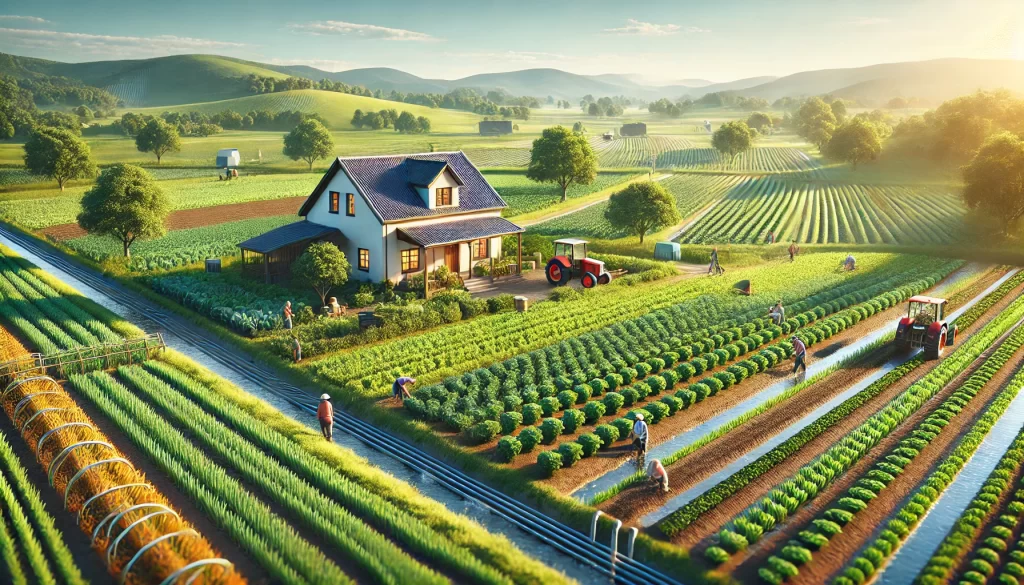India celebrates National Farmers’ Day on 23rd December to honour the invaluable contributions of farmers, who are the backbone of the nation. This day marks the birth anniversary of Shri Chaudhary Charan Singh, India’s fifth Prime Minister, who is remembered for his deep understanding of rural issues and his lifelong commitment to advocating for farmers’ welfare. Known as the “Annadatas” (providers of food), farmers play a critical role in ensuring food security, supporting rural economies, and contributing to the nation’s progress.
In recognition of their pivotal role, the Government of India has introduced a series of transformative initiatives aimed at improving farmers’ socio-economic conditions and promoting sustainable agricultural practices. These include key programs like the Pradhan Mantri Kisan Samman Nidhi (PM-KISAN), Pradhan Mantri Fasal Bima Yojana (PMFBY), and Pradhan Mantri Kisan Maandhan Yojana (PM-KMY), all designed to provide financial security, mitigate risks, and ensure long-term social security for farmers.
Agriculture, employing nearly half of India’s population, remains one of the most vital sectors of the economy. It contributes 17.7% to the Gross Value Added (GVA) at current prices for the fiscal year 2023-24. The country’s agricultural land covers approximately 54.8% of the total area, with farmers working tirelessly to cultivate food crops. These farmers are not just cultivators; they are the architects of rural development, playing an essential role in feeding the nation and sustaining millions of rural livelihoods.
In the year 2023-24, India achieved a record foodgrain production of 332.2 million tonnes, surpassing the previous year’s 329.7 million tonnes. This remarkable increase is a testament to the resilience and hard work of Indian farmers, who continue to push the boundaries of agricultural productivity. Beyond feeding the nation, they are shaping the economy and ensuring a better future for rural communities, embodying the true spirit of innovation, perseverance, and sacrifice.
Over the years, the Indian government has launched several schemes aimed at improving farmers’ lives. These include PM-KISAN, which provides direct financial assistance to farmers, PMFBY, offering insurance coverage against crop losses, and PM-KMY, which ensures pension security for farmers. Other significant initiatives like the Kisan Credit Card (KCC), Modified Interest Subvention Scheme (MISS), and Agriculture Infrastructure Fund (AIF) offer financial assistance, credit, and infrastructure development, thereby enhancing agricultural productivity and the economic security of farmers.
In a significant move to prioritize the agricultural sector, the government has increased its budget allocation for farmers. From a budget of Rs. 21,933.50 crore in 2013-14, it has surged to Rs. 1,22,528.77 crore for the fiscal year 2024-25. This remarkable increase highlights the government’s commitment to addressing the challenges faced by farmers, supporting rural infrastructure, and promoting sustainable farming practices. This investment aims to improve credit accessibility, enhance modern farming techniques, and ensure the long-term prosperity of India’s farmers.
A new initiative, the Namo Drone Didi Scheme, aims to empower women in agriculture by providing drones for agricultural services. With a budget of ₹1,261 crore, this program will benefit 15,000 Women Self-Help Groups (SHGs) by providing drones for tasks like pesticide and fertilizer application. The scheme offers 80% financial assistance, making drones accessible to women farmers, and boosting productivity while promoting gender equality in agriculture.
India is embracing technology to enhance agricultural practices. The Soil Health Card Scheme, launched in 2015, has issued over 24 crore cards, promoting efficient fertilizer use and improving soil health. Additionally, initiatives like the Clean Plant Programme (CPP) and the Digital Agriculture Mission aim to introduce climate-resilient crops and promote digital technologies to enhance crop estimation and management.
One of the latest innovations is the Kisan Kavach, India’s first anti-pesticide bodysuit, unveiled in December 2024. This protective gear is designed to safeguard farmers from harmful pesticide exposure, ensuring their health and well-being. The government is also supporting post-harvest financing through the Credit Guarantee Scheme for e-NWR Based Pledge Financing (CGS-NPF), launched in December 2024. This scheme offers credit to farmers by allowing them to pledge their stored produce in warehouses, thereby improving financial access.
Several national missions are being implemented to further bolster agricultural production and promote self-reliance. The National Mission on Edible Oils – Oilseeds (NMEO-Oilseeds) aims to boost domestic oilseed production, while the National Mission on Natural Farming (NMNF) promotes chemical-free farming practices. These initiatives reflect the government’s commitment to sustainable agriculture and food security.
As India celebrates National Farmers’ Day, it is essential to recognize the tireless efforts of farmers in building the nation’s prosperity. The schemes, financial allocations, and technological innovations introduced by the Government of India reflect its dedication to empowering farmers and ensuring their well-being. With continuous support and investment, India is poised to create a sustainable and prosperous agricultural future, ensuring that the “Annadatas” remain at the heart of the nation’s development.






